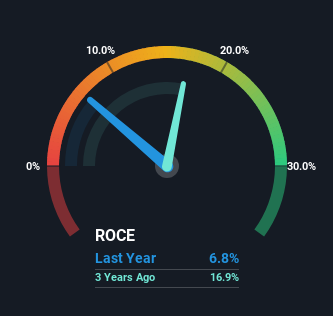Capital Allocation Trends At Mühlbauer Holding (ETR:MUB) Aren't Ideal
What are the early trends we should look for to identify a stock that could multiply in value over the long term? Amongst other things, we'll want to see two things; firstly, a growing return on capital employed (ROCE) and secondly, an expansion in the company's amount of capital employed. This shows us that it's a compounding machine, able to continually reinvest its earnings back into the business and generate higher returns. In light of that, when we looked at Mühlbauer Holding (ETR:MUB) and its ROCE trend, we weren't exactly thrilled.
Return On Capital Employed (ROCE): What Is It?
If you haven't worked with ROCE before, it measures the 'return' (pre-tax profit) a company generates from capital employed in its business. To calculate this metric for Mühlbauer Holding, this is the formula:
Return on Capital Employed = Earnings Before Interest and Tax (EBIT) ÷ (Total Assets - Current Liabilities)
0.068 = €42m ÷ (€619m - €161k) (Based on the trailing twelve months to June 2024).
Thus, Mühlbauer Holding has an ROCE of 6.8%. Ultimately, that's a low return and it under-performs the Machinery industry average of 9.8%.
See our latest analysis for Mühlbauer Holding

While the past is not representative of the future, it can be helpful to know how a company has performed historically, which is why we have this chart above. If you'd like to look at how Mühlbauer Holding has performed in the past in other metrics, you can view this free graph of Mühlbauer Holding's past earnings, revenue and cash flow.
What The Trend Of ROCE Can Tell Us
In terms of Mühlbauer Holding's historical ROCE movements, the trend isn't fantastic. Around five years ago the returns on capital were 19%, but since then they've fallen to 6.8%. However, given capital employed and revenue have both increased it appears that the business is currently pursuing growth, at the consequence of short term returns. If these investments prove successful, this can bode very well for long term stock performance.
On a related note, Mühlbauer Holding has decreased its current liabilities to 0.03% of total assets. That could partly explain why the ROCE has dropped. Effectively this means their suppliers or short-term creditors are funding less of the business, which reduces some elements of risk. Since the business is basically funding more of its operations with it's own money, you could argue this has made the business less efficient at generating ROCE.
The Key Takeaway
In summary, despite lower returns in the short term, we're encouraged to see that Mühlbauer Holding is reinvesting for growth and has higher sales as a result. In light of this, the stock has only gained 40% over the last five years. So this stock may still be an appealing investment opportunity, if other fundamentals prove to be sound.
One final note, you should learn about the 2 warning signs we've spotted with Mühlbauer Holding (including 1 which doesn't sit too well with us) .
While Mühlbauer Holding may not currently earn the highest returns, we've compiled a list of companies that currently earn more than 25% return on equity. Check out this free list here.
New: Manage All Your Stock Portfolios in One Place
We've created the ultimate portfolio companion for stock investors, and it's free.
• Connect an unlimited number of Portfolios and see your total in one currency
• Be alerted to new Warning Signs or Risks via email or mobile
• Track the Fair Value of your stocks
Have feedback on this article? Concerned about the content? Get in touch with us directly. Alternatively, email editorial-team (at) simplywallst.com.
This article by Simply Wall St is general in nature. We provide commentary based on historical data and analyst forecasts only using an unbiased methodology and our articles are not intended to be financial advice. It does not constitute a recommendation to buy or sell any stock, and does not take account of your objectives, or your financial situation. We aim to bring you long-term focused analysis driven by fundamental data. Note that our analysis may not factor in the latest price-sensitive company announcements or qualitative material. Simply Wall St has no position in any stocks mentioned.
About XTRA:MUB
Mühlbauer Holding
Engages in the production and personalization of smart cards, ePassports, solar cells, and RFID solutions in Germany, rest of Europe, Asia, the United States, Africa, and internationally.
Flawless balance sheet with low risk.
Similar Companies
Market Insights
Community Narratives




